|
|
|
Sort Order |
|
|
|
Items / Page
|
|
|
|
|
|
|
| Srl | Item |
| 1 |
ID:
113855


|
|
|
|
|
| Publication |
2012.
|
| Summary/Abstract |
Major powers are frequently urged to embrace grand strategies tied to particular International Relations theories. In the case of United States foreign policy, scholars generally analyse a well-known set of strategic choices - primacy, selective engagement, offshore balancing, collective security and cooperative security - favoured by relatively mainstream realist and liberal thinkers in International Relations. This article explores the evolution of cooperative security as an idea from its clear ties to liberal and neoliberal international relations theory to its current understanding in world politics, which is surprisingly consistent with many emancipatory ideals of critical International Relations theory. Cooperative security no longer merely implies multilateralism, negotiation and arms control. Rather, security is now more frequently described as indivisible, and genuine cooperation is said to require shared decision-making and consensual practices. Non-governmental organisations are more and more granted a voice in security discussions, as are international institutions. While weapons and warfare remain important security concerns, the cooperative security agenda today includes ideas associated with human security, including environmental calamity, global inequality and hunger.
|
|
|
|
|
|
|
|
|
|
|
|
|
|
|
|
| 2 |
ID:
113853
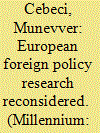

|
|
|
|
|
| Publication |
2012.
|
| Summary/Abstract |
This article attempts to criticise European foreign policy research from within, portraying how some of its scripts are privileged and how they construct an 'ideal power Europe' meta-narrative. It argues that European foreign policy researchers engage in such construction through, firstly, assuming that the EU is post-sovereign/post-modern; secondly, naming the EU as a model; and, finally, conceptualising the Union as a normative power. The article scrutinises European foreign policy research through a deconstruction of its texts and displays how certain knowledge about the EU and European foreign policy is produced and reproduced. It further reveals how the 'ideal power Europe' meta-narrative contributes to the dominative dimension of European foreign policy.
|
|
|
|
|
|
|
|
|
|
|
|
|
|
|
|
| 3 |
ID:
113857
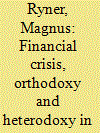

|
|
|
|
|
| Publication |
2012.
|
| Summary/Abstract |
Although the financial/Eurozone crisis has profound effects on the EU, European integration scholarship failed to even recognise that there might be a problem. This article argues that this is due to the highly orthodox nature of European integration scholarship and the blind-spots that inhere in its instrumentalist basic code. It makes the case for a heterodox recasting of the production of knowledge about the EU, and argues that post-Keynesian, post-Marxist and neo-Weberian political economy can make significant contributions in that regard.
|
|
|
|
|
|
|
|
|
|
|
|
|
|
|
|
| 4 |
ID:
113851


|
|
|
|
|
| Publication |
2012.
|
| Summary/Abstract |
It is now commonplace to bemoan our field's lack of practical relevance, and to blame this sorry situation on our penchant for ever-more abstract theorising over the analysis of real-world phenomena. This article challenges this rendition of the problem. Not only is the theory versus relevance thesis difficult to sustain empirically, there are good reasons to believe that even the most abstract forms of metatheory are relevant to sound practical knowledge. More than this, though, the theory versus relevance thesis misconstrues the problem. The obstacle to practical relevance is not theoretical abstraction, but a series of other disciplinary problems: our lack of any real interest in the nature of politics as a distinctive form of human action (which so animated early scholars in the field); the loss of the field's early practical intent; the sadly too common bifurcation of explanatory and normative inquiry; and the disappearance of the figure of the international public intellectual.
|
|
|
|
|
|
|
|
|
|
|
|
|
|
|
|
| 5 |
ID:
113856
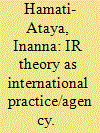

|
|
|
|
|
| Publication |
2012.
|
| Summary/Abstract |
Adopting a reflexive, praxeological understanding of science that rejects the objectivist epistemic antinomy of theory and practice, this article offers two complementary Bourdieusian readings of International Relations theory that specifically aim to conceptualise the structural position of 'periphery' scholars, as well as their extant and potential 'space of possibilities' in the discipline. Grounded in a sociological appraisal of International Relations, the 'clinical' approach objectivates International Relations as a field of international practice wherein the production of theoretical knowledge results from the meeting of different socio-academic habitus and their associated positions with the objective structures of International Relations and the international system. It highlights the relation between International Relations theory and the structural (dis)positions of its authors, the conditions that allow some theories to be objectively possible, meaningful, structuring representations of the world, and the structural constraints imposed on International Relations theorists. The 'cynical' approach suggests how a 'clinical' understanding of International Relations can help marginalised, 'periphery' scholars make sense of their 'space of possibilities' within the discipline, and develop a praxeological, reflexive attitude that could turn them into efficient international agents capable of promoting different scholarly perspectives. More specifically, the article argues that their non-native habitus is a potentially subversive capital - and hence a potential agency of structural change.
|
|
|
|
|
|
|
|
|
|
|
|
|
|
|
|
| 6 |
ID:
056496


|
|
|
| 7 |
ID:
113852


|
|
|
|
|
| Publication |
2012.
|
| Summary/Abstract |
International Relations theory does not distinguish enough between prediction and vision, and, as a result, retreats unduly from practice. This article argues for the importance of political vision in the study of international relations by complicating the standard social science distinction between fact and value. Using Nietzschean genealogy, it argues for a dual relationship between the normative and the empirical: the deduction of norms from the constraints of history; and the normative, proactive responses to this history within these constraints. This dual relationship underscores the importance of political vision and political leadership in the study of international politics. The article then analyses present historical challenges and suggests several normative responses to them that can be understood in the terms of 'political vision' in International Relations. It finally takes the example of the present absence of vision and leadership in the European Union and argues for a political Europe, the Union as a political power.
|
|
|
|
|
|
|
|
|
|
|
|
|
|
|
|
| 8 |
ID:
113847
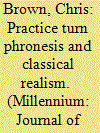

|
|
|
|
|
| Publication |
2012.
|
| Summary/Abstract |
The 'practice turn' in International Relations seems on the face of it to be a very promising development; generally associated with Bourdieu and Foucault, it can also be seen as linked to the Aristotelian notion of phronesis (prudence or practical wisdom) and to the classical realist virtue of 'prudence' (prudentia). There are family resemblances here, but also differences; for Aristotle and the realists, practical wisdom is associated more with the intellect, while the 'practice turn' places great emphasis on the role of habitual behaviour. Writers as diverse as Flyvbjerg and Macintyre have argued for a 'phronetic social science' as an alternative to neo-positivist conceptions of the role of the conduct of social enquiry - but the classical realists could argue that they have already provided a 'phronetic international relations theory' . Still, the implications of Aristotle's comment that 'prudent young people do not seem to be found' need to be confronted. Is 'practical wisdom' something that can be achieved by study, or is it only achievable in the context of the kind of lived experience that few students of International Relations or International Political theory of whatever age can actually claim?
|
|
|
|
|
|
|
|
|
|
|
|
|
|
|
|
| 9 |
ID:
113848
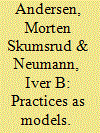

|
|
|
|
|
| Publication |
2012.
|
| Summary/Abstract |
The everyday meaning of 'practice' is something like concrete 'doings' or 'what is being done' in a social setting. Its everyday counter-concept is theory. Intuitively, this may lead us to think of practices as what is really going on in the world, as opposed to theories or models. This commonsensical meaning of practices reinforces the separation between theory and empirical reality. We argue that such an understanding has informed much of the ongoing 'practice turn' in International Relations. We also argue that this is not necessarily an efficient way of conceptualising 'practices', because practices might end up being too general a concept to be analytically useful. To counter this, we argue, one must be explicit about practices at the level of models, that is, in fictional representations of the world. This can help in studying them as endogenous phenomena, and not only as the practical counterpart of some other phenomena, or emanating from unspoken theoretical assumptions of, for example, conscious rule-following behaviour, interests, identities, structures and so on. As an illustration of what a model of practice might look like, we include a case study of Iroquois diplomacy as practice. Using a model, without relying on unstated assumptions exogenous to it, we represent this particular case through assuming that both the agents and their social environments emerge through practices.
|
|
|
|
|
|
|
|
|
|
|
|
|
|
|
|
| 10 |
ID:
113850
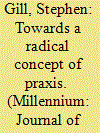

|
|
|
|
|
| Publication |
2012.
|
| Summary/Abstract |
This article argues for a radical conception of praxis in international relations. By praxis is meant those forms of critical theoretical and practical activity that are not only linked to understanding, explaining and acting in international relations but also transforming those relations to help constitute a more ethical, just and sustainable world order. The argument is developed as follows: (1) discussion of theoretical perspectives, and how they constitute dominant paradigms of International Relations in the West, particularly in the USA. Such dominant paradigms are shaped by a liberal ontology, opposed to Marxism and critical theory. (2) A critique of 'imperial common sense' that is bound up with US supremacy in an unjust world of deepening crises, growing inequality, social dislocations and unsustainable accumulation. Here my argument involves a dialectical strategy that critically addresses the nature, self-evidence and global influence of mainstream American International Relations. (3) A discussion of how new forms of praxis are emerging, seeking to develop radical alternatives that are sober, imaginative, sustainable and politically and ethically credible - in the multiple, diverse and new forms of political agency reflected in the figure of the 'post-modern Prince'. The article concludes by outlining elements of a radical research agenda to address significant intellectual, ethical and public policy issues in the emerging world order.
|
|
|
|
|
|
|
|
|
|
|
|
|
|
|
|
| 11 |
ID:
113849


|
|
|
|
|
| Publication |
2012.
|
| Summary/Abstract |
This article challenges International Relations to turn its view of war around and start not with states, militaries, strategies, conventional security issues or weapons, and not with the common main aim of establishing causes of war. The challenge is to conceptualise war as a subset of social relations of experience, on the grounds that war cannot be fully apprehended unless it is studied up from people who experience it in myriad ways and not only down from abstract places of International Relations theory. To study war as experience requires that the body come into focus as a unit that has war agency and is also a prime target of war violence. It also requires exploration of the concept of experience. Using an exemplary texts approach, the article briefly reminds us where the field is in its war concerns, before noting work on contemporary wars conducted under the flag of feminist International Relations, where experience and bodies have always been front and centre, and where a social war studies emphasis is developing. The discussion then raises definitional complexities that must be addressed and suggests areas where various International Relations traditions could collaborate with feminist International Relations and fields like anthropology to study the social relations of war.
|
|
|
|
|
|
|
|
|
|
|
|
|
|
|
|
| 12 |
ID:
113854
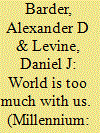

|
|
|
|
|
| Publication |
2012.
|
| Summary/Abstract |
International Relations' constructivist turn - that body of approaches emerging in the late 1980s/early 1990s in which international outcomes were held to be predicated upon complex social arrangements, rules, norms, institutions, language and culture - emerged from a unique historical and intellectual moment. Initially, this theoretical turn was deeply committed to reflexivity and circumspection: since events were held to be contingent and theorists were bound up in them, the obligation to sustained critical self-reflection was central to the project. That commitment would not last, however. By the mid-1990s, it had given way to a 'middle ground' (or via media) position, which aligned itself with dominant materialist and rationalist methodologies and epistemologies. We wish to examine that moment of realignment: how it happened, and what it might mean. We argue that having imbibed a degree of the free-floating optimism that was 'in the air' in the 1990s, via media constructivism's leading scholars came to believe that it was no longer necessary to problematise the historicity and contingency of their own historical moment and philosophical horizons. The post-Cold War 'world', we hold - or, at any rate, one account of it - was 'too much with' via media constructivism: selectively constraining its reflexive impulses and critical tools in ways that, however unintentionally, provided cover for particular normative and ideological configurations. To move past this, we argue that via media constructivists need a sustainably critical ethos: one which 'repoliticises' international theory by unmasking its hidden ideological and political starting points.
|
|
|
|
|
|
|
|
|
|
|
|
|
|
|
|
|
|
|
|
|